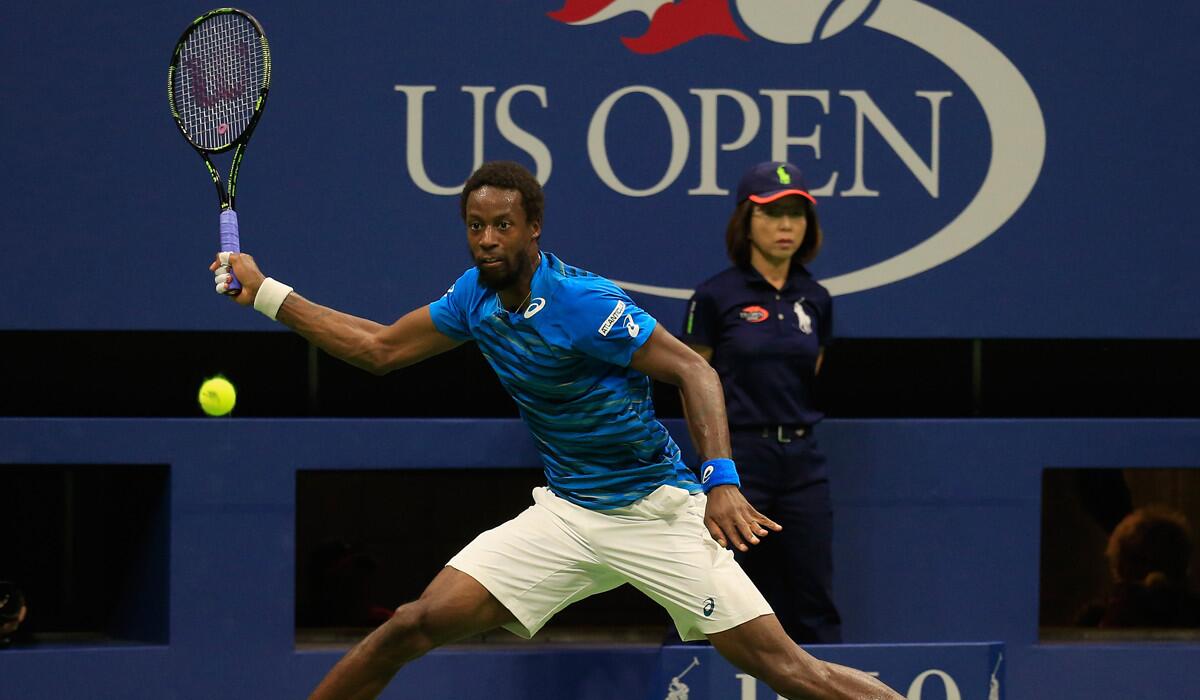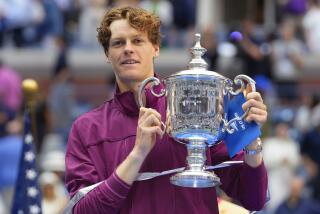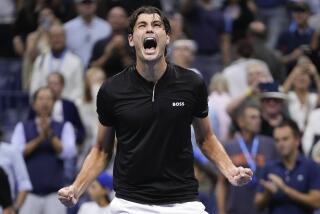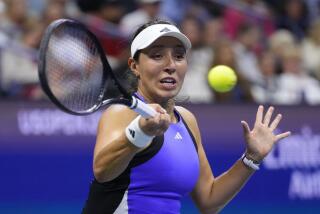Gael Monfils puts on a show in reaching his first U.S. Open semifinal, will face No. 1 Novak Djokovic next

The Showman cometh, and the Showman goeth.
It is becoming obvious Gael Monfils can win tennis matches in either guise. Monfils reached his first U.S. Open semifinal with a controlled and measured performance against his French countryman Lucas Pouille, winning, 6-4, 6-3, 6-3, on Tuesday afternoon.
Controlled and measured are words usually not associated with the dynamic Monfils, who has not lost a set in five matches here and is 19-2 on hard courts since Wimbledon. Seeded 10th, he will play No. 1 Novak Djokovic of Serbia for a spot in the Open final.
Djokovic’s night was shortened when his quarterfinal opponent, No. 9 Jo-Wilfried Tsonga of France, retired because of an injured right knee after losing the first two sets, 6-3, 6-2.
Opponents keep crumbling, at least physically, against Djokovic at the Open. He has benefited from two injury withdrawals during matches and one walkover, in the second round. He has had to play only two complete matches and a total of about 6½ hours of tennis to reach the semifinals.
In the quarterfinals, Djokovic noticed Tsonga’s service speed dropping as the match went along.
“Obviously I was aware of it,” Djokovic said of Tsonga’s physical woes. “But again, I kept my composure.”
Monfils, presumably, will be able to go the distance against Djokovic. The 30-year-old is playing some of the best and most inspired tennis of his career and reached his first Grand Slam semifinal since the French Open in 2008.
“I play tennis because I love the sport,” Monfils said. “If not, I won’t wake up every morning, train, because most people think that jumping or doing trick shot is gifted. Yes, it’s gifted, but it’s a lot of work.”
Pouille was coming off a potentially career-defining win over two-time Open champion Rafael Nadal of Spain in the fourth round and seemed to have little left in the tank, having played three consecutive five-setters. Monfils didn’t face a break point, recorded 13 aces and double-faulted only twice.
There are limits to being a showman and Monfils tried his best to educate the media about his mind-set — for example, explaining that he doesn’t dive on the court for the fans’ benefit.
“Come on, to be honest, I’m gonna hurt myself for people? No. I dive because I want to win the point,” he said. “Definitely I want to win the point. When you make the show, honestly, it’s to entertain, but it’s to win. So what’s the point to make the show and lose?
“That’s why people think, ‘Oh he’s jumping, he’s sliding.’ In the end, you think I’m stupid?”
Monfils later said he was inspired by and respected the work ethic and example of the Cleveland Cavaliers’ LeBron James. He has yet to meet James but has an idea of what he might say to him.
“If I met him, first thing I would tell [him], ‘I want to dunk on you,’” Monfils said, drawing laughter. “No, I might ask him so many questions. How he is, how he feels, how it is to be the leader, like a great champion. How do you think about everything? You know, I think it would be a great day if I can.”
The day and night on the main show court, Arthur Ashe Stadium, was largely devoid of competitive drama. No. 2-seeded Angelique Kerber of Germany, who is making serious push for the top ranking, got through a tight first set and eased through the second against last year’s finalist, Roberta Vinci of Italy, winning, 7-5, 6-0, in a quarterfinal.
In the semifinals, Kerber will play unseeded Caroline Wozniacki of Denmark. Wozniacki, a two-time U.S. Open finalist, needed 65 minutes to complete a 6-0, 6-2 win over a hobbled Anastasija Sevastova.
The 26-year-old Latvian tweaked her right ankle in the second game and later needed treatment but pressed on. She was asked if it took anything away from her impressive tournament and displayed a keen sense of humor with her answer.
“I don’t think it takes away. I still won two games,” Sevastova said. “It’s tough to end like that, but it’s tennis. I could have played amazing but still lost. I would hurt more, I think.
“If somebody asked me before, ‘Would you take a quarterfinal and lose 0 and 2 or would you take a first round and lose, 7-6, in the third? For sure I would take quarterfinals.”
More to Read
Go beyond the scoreboard
Get the latest on L.A.'s teams in the daily Sports Report newsletter.
You may occasionally receive promotional content from the Los Angeles Times.











